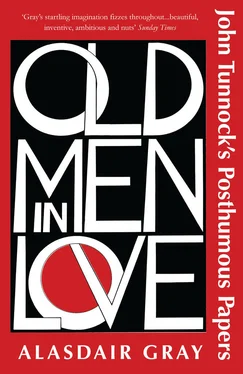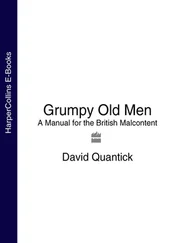When exam papers had been marked my chances of borrowing these comics ended, for outside the classroom I was ashamed to look at them when others could see me. My pocket money would have let me buy many but I was appalled by the thought of a shopkeeper recognizing my vicious depravity as I pointed to an American comic or nudist health magazine and said, “That one please!”. I sometimes wished an atomic war would kill everyone in the world but me so that I could enter any of these shops and shamelessly gloat over all that excited me.
But drunk with sherry on this special Saturday afternoon I did the deed without an atomic war. In part of the Cowcaddens that was demolished in the 1970s I stopped before the right sort of shop and, with a thrumming excitement in my lower stomach, stared shamelessly at the covers of paperback books in the window. One called Love for Sale showed (from behind) a line of chained-together blondes wearing only knickers and high-heeled shoes, being urged across sand dunes by a man with a whip. Beyond the display I saw the back of a customer buying something. When he left the shop I hurried in, laid my briefcase on the counter and, looking away from the shopkeeper, pointed to Love for Sale and said, “That one please and. . yes, and also that. . and er, hm hm hm. .” (I pointed to American comics on racks along the walls) “. . I’ll take that and that and that and that too. I’m buying for a few friends.”
“It’s nice to have friends,” said the shopkeeper pleasantly. I was horrified to suddenly see she was a small woman a bit like Aunt Nell. With a face that felt red hot I flung down some pound notes, muttered “Keep the change”, zipped books and comics into my briefcase, rushed out and hurried home.
I found the aunts having afternoon tea with a friend of their own age and sex.
“How was Stewart and his mother?” said Nan as I looked round the door. Nell asked, “You look flushed, have you been running?” “Things went quite well,” I said, “In fact too well, that’s why I’m flushed. Mrs Doig insisted on pouring me a glass of that sherry you gave her and I’m not used to it. I’m going to lie down in the study for an hour or two. Please don’t bring me anything. See you later.”
In the study I turned (for the first but not last time) the door key that locked me in, then spread my purchases on the desktop and doted over them, masturbating three times in succession. After that, sick with self-disgust, I would have burned them in the study fire had the season been cold enough for one. Instead I locked them in a desk drawer and afterwards kept the key in my trouser pocket.
Perhaps a fortnight passed before an appetite for new pornography drove me out in search of another dirty bookshop, because I never bought from the same shop twice. After drinking all the sherry left in Grandpa Tunnock’s three-quarters full decanter I set out with my usual excuse of going for a walk with Stoory Doig, astonished that my aunts did not see how drunk I was. Before every full bottle of sherry had been drunk my pornography was nearly too many for the desk drawers. One wet Sunday I locked the study door, spread my furtive library on the hearthrug and went carefully through it, scissors in hand, cutting out pictures that most excited me and burning the rest — which reminds me what a strangely different world I and everyone else then inhabited, a world as different from 2005 Glasgow as 1954 was from the world of mid-Victorian encyclopaedias.
The rooms in nearly every British house were heated by an open fire burning in a grate inside a fireplace , a cavity in the thickness of the wall. The fire was fed with lumps of coal from a big brass jug called a scuttle on a tiled section of floor in front of the grate. In terrace houses the scuttle was filled from a small basement room called the coal-cellar ; and in tenements from a stoutly made box called the bunker on the stair landing. Coal-cellars and bunkers were filled by men who carried the coal in on their backs in huge sacks from an open lorry that usually called once a month. Did each sack contain a hundredweight? Half a hundredweight? A quarter? I only know that twenty hundredweights made a ton and once, when older, I tried to lift a full coal sack and failed. The sacks came from a great heap of coal in a yard called a ree in Scotland. Everywhere people lived had a coal ree a few miles away except in parts of the Highlands and Islands where folk burned peat. The coal rees were on branch railway lines along which coal-burning steam locomotives brought trucks of coals from the mines, the last of which closed in Scotland four or five years back why am I going into all this? Before the 1960s almost any photograph of an inhabited British landscape showed a trail of steam drifting across. They were so common we did not notice them, did not even notice them vanish with the coming of electric trains. Glasgow made coal fires illegal around 1970 when it began losing its heavy industries. This put an end to amazingly thick winter fogs that had been killing folk with poor lungs for more than a century. This information is necessary to explain how I managed to burn so much paper without my aunts noticing. Even so, they would have smelled it had I not spread the job over two weekends. From then on I kept my special selection of cut-out heroines and suggestive pictures between the pages of Cruden’s massive Concordance of the Holy Scriptures .
For I had begun to find the words in the books and comics repetitive. The fantasies they inspired were quite separate from the great Rabelaisian-Balzacian-Ovidian-Aristophanic romance I dreamed of making me famous one day, a romance in which the women were princesses or witches, and free agents. In my perverse alternative story they were completely managed by very kind or cruel men, all powerful aspects of ME. The cover of Love for Sale indicated how they could be connected in a single narrative. I was not as insatiable as some Turkish sultans. After the paper holocaust the slaves in my harem dwindled to six with two permanent favourites: Jane Russell as she appeared in The Outlaw film poster (still a popular male sex-icon in the fifties) and Sheena the Jungle Girl. The other four were continually replaced through my fortnightly excursions in search of yet another dirty bookshop. The absence of these shops today is another sign of changed times. Pornography that was prosecuted as criminal in 1950 can now be bought in almost any shop, and things once illegal in print are shown and openly advertized in video films. Only child pornography causes public outrage now, and I would be remembering this phase of my life without shame were it not for Stewart Doig.
I hated lying to my aunts about him. It is also impossible to pretend something for a long time without making it come partly true. Three times a week or more I had to share a desk with Stewart and guilt led me to reply less and less gruffly when he spoke to me. Perhaps loneliness also inclined me to want a partner in crime. One day I muttered to him, “Listen, I don’t want to be seen talking to you —” (this opening was so brutal that I hastily added) “— you or anybody else here. I don’t want to be thought pally with anyone in this school or in sight of this school, but would you like to go a walk with me Saturday afternoon?”
He stared and nodded. I said, “Meet me at the flagpole in the Botanic Gardens at two, right?”
Again he nodded, open-mouthed. I bent my face close to the jotter I was writing in and muttered, “If you say another word to me before then I won’t turn up.”
What a nasty wee bastard I was.
We met at the flagpole and I took him for a walk along the disused railway line running from the Botanic Gardens down to the Clyde by way of two or three derelict railway stations linked by short tunnels. I was bringing him to a dirty bookshop I had found in Scotstoun, near Victoria Park, and meant to prepare him for that by discussing sex. This was almost impossible. Stoory and his mother belonged to a Christian sect called The Brethren who disapproved of sex. Instead we passionately discussed Evil, which Stoory thought started in the Garden of Eden when Eve, tempted by Satan disguized as a snake, ate God’s forbidden fruit that gave knowledge of Good and Evil. I argued that God was wrong to punish Adam and Eve for eating the fruit, as they could not know they were doing evil until they had eaten it. And since God had created the Satanic serpent it must have been His agent. In such discussions every answer to an objection raises other objections. The desire of Stoory and me for the last word kept us arguing fervently until at last we reached the shop where I halted and interrupted him saying, “Change the subject! Some of this must interest you. It interests most men and certainly interests me.”
Читать дальше












